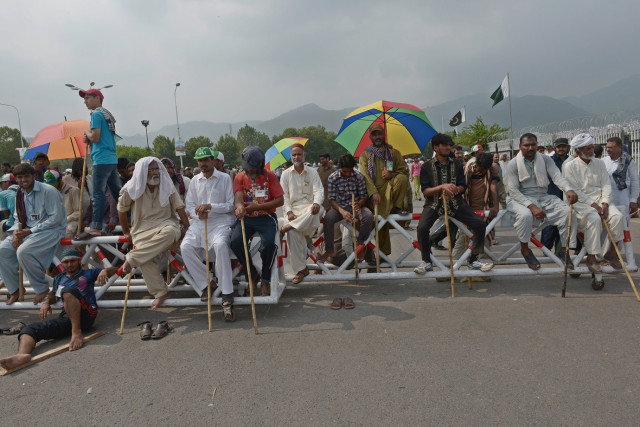Separation of powers: SC cannot serve as guarantor in ongoing crisis, say PPP, JI
PTI submits 16 queries, questions court jurisdiction over political gatherings

The Supreme Court cannot act as guarantor to end the ongoing political unrest, the Pakistan Peoples Party (PPP) and Jamaat-i-Islami (JI) said on Tuesday in a written reply submitted to the top court.
On the other hand, Pakistan Tehreek-e-Insaf proposed 16 questions instead of replying to the Lahore High Court Bar Association Rawalpindi bench petition for the determination of the Supreme Court’s jurisdiction and the scope of fundamental rights of assembly in accordance with the Constitution.
Chaudhry Aitzaz Ahsan submitted the reply on behalf of PPP and JI in the apex court, stating that there is no justification for any extra or unconstitutional act by any state functionaries. The reply states that provincial autonomy is now fully secured under the provisions of the 18th amendment to the Constitution. “This obviously means that ‘rigging issues’ relating to the National Assembly could not be made excuse for dissolution of any provincial assembly or government, otherwise it would be in violation of the principle of federation as held by the apex court’s three judgments,” the reply states.
Both major parties, while referring to the SC’s Asghar Khan case judgment, said no role could be played by secret agencies or officials thereof to favour one political party, group or individual over another in the political affairs of the country or in free and fair elections.
The reply says that the top court is the apex court to ‘adjudicate’ cases and controversies between the parties to proceedings before the court under its constitutional or statutory jurisdiction. The court upholds the separation of power, independence of judiciary and rule of law and the Constitution, which is to ensure a level playing field for all political actors with no role for an ‘outside umpire’, the reply adds. “Thus no issue whether political or otherwise could be taken outside the ambit of the basic concept of the supremacy of the Constitution,” it states.
Both parties have expected that the court will not go into the larger questions that are political in nature and require deliberation in parliament or otherwise, including future reforms relating to the electoral process and any resolution to the current political crisis.
The reply further states that several elections were held in the past and some of them were seriously alleged to have been ‘rigged’. “Well organised rigging relating to the overall mandate is quite different from the allegations of rigging by one candidate in a constituency or another,” the reply states. Both parties have suggested the court to direct all the political parties to resolve the political crisis.
Referring to Article 5 of the Constitution, the parties submitted that the severity of the political crisis cannot result in, lead to or cause or provide any justification whatsoever for unconstitutional actions.
The PTI’s reply
Barrister Yousaf Khosa on behalf of PTI has proposed several questions: Does the Supreme Court have the jurisdiction to grant the Constitution petition 74/2014 in terms of Article 184(3) read with Article 199 of the Constitution? Does the definition of ‘person’ provided in Article 199 (5) read with Article 184(3) of the Constitution include a political party duly registered under laws, particularly in terms of a direction by the Supreme Court to such a political party for its compliance?
PTI questioned whether any judgment can be passed by the SC to direct or regulate a political gathering with retrospective effect, asking also what the word ‘dharna’ means in the context of the existing constitutional petition 74/2014. How should a political dharna be regulated in the future and is there any legislation that currently regulates such gatherings, the reply asks. What are the responsibilities and obligations of the government against whom such a political dharna is being staged? Who and how, will regulate the actions of the government against whom such a dharna is to be or being exercised?
The reply also focuses on the definition of ‘public order’ and asks, What is the redressal mechanism for citizens who are of the view that they have been deprived of their rights to assembly as provided under the Constitution and deprived unlawfully by the State?
In another question, the party asks, What is the scope of Article 19 of the Constitution? What is the redressal mechanism available against those who have breached constitutional right guaranteed under Article 19?
The reply asks, What is the balance among various Fundamental Rights guaranteed by Article 9,12,15,16,17,18 and 19 of the Constitution read with Article 4 and 5 of the Constitution and can the state machinery can curb one right on the pretext of protecting the other?
Published in The Express Tribune, September 10th, 2014.






1724319076-0/Untitled-design-(5)1724319076-0-208x130.webp)












COMMENTS
Comments are moderated and generally will be posted if they are on-topic and not abusive.
For more information, please see our Comments FAQ